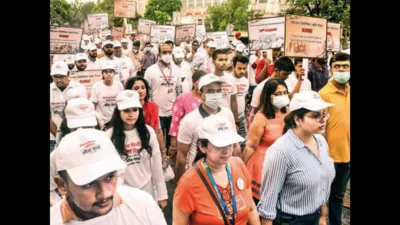Delhi Metro Commemorates Partition Horrors Remembrance Day
In a heartfelt tribute to the somber memories of the Partition of India, the Delhi Metro has organized a series of exhibitions at two of its metro stations to commemorate ‘Partition Horrors Remembrance Day.’ This initiative stands as a testament to the commitment of Delhi Metro to preserving historical consciousness and honoring the profound impact of the Partition on millions of lives.
Table of Contents
Honoring Historical Memory
Partition Horrors Remembrance Day is observed annually on August 14 to remember the tragic events of 1947 when India was divided into two separate nations—India and Pakistan. The Delhi Metro’s decision to commemorate this day reflects a deep respect for the historical significance of the Partition and the pain endured by those affected. By hosting exhibitions at key metro stations, Delhi Metro not only honors the memory of the victims but also educates the public about the historical events and their implications.
Exhibition Locations and Themes
The exhibitions are set up at two prominent Delhi Metro stations: Rajiv Chowk and Kashmere Gate. These locations were chosen for their accessibility and high footfall, ensuring that the message reaches a wide audience. At Rajiv Chowk, the exhibition focuses on the personal stories of those who lived through the Partition. Through photographs, letters, and personal artifacts, visitors gain insight into the human side of this historical event. The display features poignant narratives and testimonials that highlight the resilience and suffering of individuals during this turbulent period.
Kashmere Gate station’s exhibition takes a broader view, showcasing the political and social ramifications of the Partition. This display includes maps, documents, and historical analyses that illustrate how the Partition reshaped the subcontinent’s geopolitical landscape. By presenting this information, the exhibition aims to foster a deeper understanding of the long-term impacts of the Partition on regional and international relations.
Educational Impact and Public Engagement
One of the primary goals of these exhibitions is to educate the public about the Partition’s historical context and its consequences. The Delhi Metro’s initiative is a powerful tool for raising awareness and encouraging dialogue about this critical period in history. By providing an accessible platform for historical education, the exhibitions help bridge generational gaps and ensure that the memories and lessons of the Partition are preserved for future generations.
The interactive elements of the exhibitions, such as digital screens displaying survivor interviews and interactive maps, engage visitors in a meaningful way. These features allow individuals to explore the Partition’s impact from multiple perspectives, making the historical information more relatable and impactful.
Promoting Historical Awareness
The Delhi Metro’s exhibitions play a significant role in promoting historical awareness and fostering a sense of collective memory. In an era where many historical events risk being forgotten, initiatives like these help keep the past alive and relevant. By integrating such exhibitions into daily public life, the Delhi Metro encourages people to reflect on the past while navigating their daily routines. This approach not only educates but also connects people with their shared history in a personal and immediate way.
The Role of Public Transport in Cultural Preservation
Public transport systems like the Delhi Metro often serve as vital cultural conduits, connecting people across different regions and backgrounds. By hosting these exhibitions, Delhi Metro leverages its extensive reach to make history accessible to a diverse audience. This integration of cultural and historical education into everyday infrastructure highlights the potential of public transport to contribute to cultural preservation and public awareness.
Community Response and Reflections
The response from the community has been overwhelmingly positive, with many expressing appreciation for the Delhi Metro’s efforts to honor the Partition Horrors Remembrance Day. Visitors have praised the exhibitions for their informative and respectful portrayal of a significant historical event. For many, the exhibitions have provided a valuable opportunity to learn more about the Partition and reflect on its enduring legacy.
In addition to individual reactions, educational institutions and community organizations have also supported the initiative. Schools and colleges have organized field trips to the exhibitions, allowing students to engage with the historical material in an interactive setting. This collaboration underscores the importance of such initiatives in fostering historical literacy and encouraging critical thinking among young people.
Conclusion
The Delhi Metro’s commemoration of ‘Partition Horrors Remembrance Day’ through exhibitions at Rajiv Chowk and Kashmere Gate stations stands as a meaningful tribute to a pivotal moment in history. By combining education with public transportation, Delhi Metro not only honors the memories of those affected by the Partition but also promotes a broader understanding of its historical significance. This initiative exemplifies how public infrastructure can play a crucial role in preserving cultural heritage and fostering historical awareness, ensuring that the lessons of the past continue to inform and inspire future generations.








